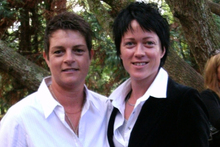Apology, but gays still not welcome
Monday, July 15th, 2013The New Zeland Herald
Owners of a Whangarei lodge have apologised after turning away a lesbian couple who had booked a shared bed – but are not ready to welcome back gay people.
Michael Ruskin of the Pilgrim Planet lodge confirmed yesterday that he and his wife Karen had provided a written apology to Kaitaia woman Jane Collison, to whom Mrs Ruskin refused accommodation after she arrived with her partner Paula Knight to stay in a pre-booked room with a king size bed.
But despite the apology he indicated he was still not prepared to allow gay guests to sleep together in what he regarded as part of his home.
The case provoked an outcry in New Zealand and overseas when first reported in May. It also led to a complaint by Ms Collison to the Human Rights Commission, which held a mediation session in Whangarei last week.
Mr Ruskin said he had to shut down his Facebook page after it was deluged with abusive messages from around the world, and that he and his wife received two death threats by email and in a voice message, which they referred to the police.
In a written statement agreed to at mediation, they have since apologised for “humiliation and inconvenience” caused to Ms Collison when the same-sex couple turned up at the lodge after driving to Whangarei from their home near Kaitaia.
But the Ruskins added in the statement that they wished to be able to live according “to our consciences and beliefs”.
When asked by the Herald if Ms Collison and her partner would be welcome back at the lodge, Mr Ruskin initially said: “Not as a same-sex couple.”
He then said he had nothing against the couple and didn’t want the issue stirred up again.
But when asked whether same-sex guests in general could stay at Pilgrim Planet, he said: “They will not get a double bed – I’m sticking to my principles.”
Ms Collison said she did not feel at liberty to comment, given that the Ruskins’ statement arose from a confidential mediation session to address her complaint alleging a breach of the Human Rights Act.
Rainbow Youth chairman Duncan Matthews said he applauded the Ruskins in apologising to Ms Collison and recognising that their actions hurt her and Ms Knight, but urged them “to take the next step, think a bit more deeply and recognise that Paula and Jane’s relationship doesn’t affect their beliefs”.
“They are entitled to their beliefs but still have to work with society every day.”
The acting chief executive of the gay and lesbian counselling service Outline, Stephen Newton, said it was “shocking” that a commercial service provider should turn away people on the basis of their sexual orientation in the 21st century.
Human Rights Commission spokesman Gilbert Wong said he could not discuss the case except for confirming that a resolution had been reached before a mediator, which meant no further action would be taken on Ms Collison’s particular complaint.

